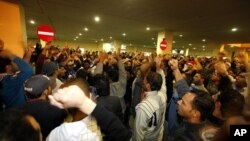As in much of the world, people in Southeast Asia are watching the pro-democracy protests spreading in the Middle East through a prism of their own experiences and interests.
Demonstrators in Egypt were able to peacefully force President Hosni Mubarak to relinquish power after three decades in office. But similar protests in Iran, Libya, Bahrain, and Yemen are being violently suppressed.
Twelve years ago, Indonesia went through a similar experience, forcing out President Suharto. Many regional political analysts say Indonesia's peaceful transition to a multi-party democracy should serve as a role model to others in the Muslim world.
Skepticism
But on the streets of Jakarta some people offer words of caution. Mia Alviera says Indonesia is not yet a true democracy.
She says it is true that Indonesia is the most populous Muslim country but they are still divided and not performing well in many areas, such as religion and politics.
Rising violence against minority groups and corruption, she says, make many here feel like democracy is not working.
Contagious?
Renaldi at the Sunda Kelapa mosque agrees that many Indonesians are frustrated with the government. He sympathizes with the peaceful protesters in the Middle East, but worries about what it means for Indonesia.
He says he is concerned that if what is happening in the Arab world is not soon resolved, it will be contagious.
Concern
In a Bangkok, Thailand neighborhood popular with residents and visitors from the Middle East, people expressed concern about the protests.
Ali Al-Jaafari, from Oman, says he thinks the protests will not spread much further in the Middle East, and certainly not to East Asia, where he says the culture is very different from Arab culture.
"I don’t think anything will happen to [the Persian] Gulf at all, especially Emirates, Kuwait, Saudi Arabia, Oman," he said. "All these countries are well settled or most of the people they are having a good life."
But Essa Ghazzi, a Kuwaiti, said he did not think the protests would bring real change to the Middle East.
"Stupid, because if they don’t like the governments they have now - they’re going to have worse someway or another. I don’t trust politicians," he said.
The biggest concern for many people in Southeast Asia was the violence that is being used to end the protests. Many people said they fear that would make the protests only worse.
Southeast Asia Expresses Support, Concern Over Mideast Turmoil
- By Brian Padden












